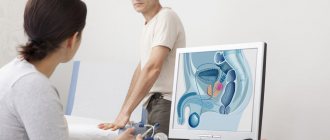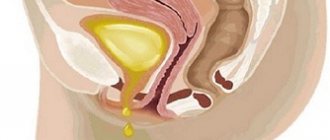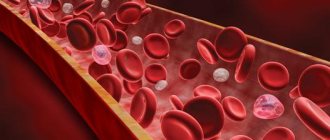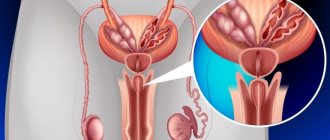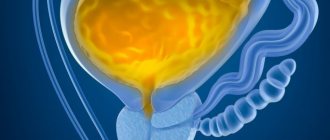Reasons for the development of pathology
The main factor causing problems with urination is benign and malignant prostate tumors. Overgrown tissue of the gland leads to compression and obstruction of the urethra.
When the prostate tissue is swollen, pressure on the walls of the urethra interferes with the free outflow of urine, fluid stagnation develops, and the inflammatory process intensifies. With prostate adenoma, doctors detect an acute form of urine retention in 1–7% of patients.
Other causes of ischuria in men:
- blockage of the urethra with a stone or blood clot;
- weak urine flow – readings below 12 ml/s;
- narrowing of the urethra during an active inflammatory process;
- prostate injury;
- inflammation and development of prostate abscess;
- prostate cancer;
- consequences of operations on the bladder, bean-shaped organs, prostate gland;
- prolonged bed rest after surgical treatment;
- pathologies of the nervous system that provoke disturbances in the tone of the bladder, sphincters and urethra.
Problems with fluid excretion in most cases develop in old age, in patients whose prostate volume exceeds 40 ml. With sedentary work, persistent constipation, and addiction to alcohol, ischuria is diagnosed more often in men. An important point for determining the risk of prostate cancer is a PSA level above 2.5 ng/ml. Ishuria code according to ICD – 10 – R33.
What does mucus in urine mean in men and what diseases does it indicate? We have the answer!
Learn about the symptoms and treatment methods for multicystic kidney disease in a child from this article.
Treatment
What to do at home? The answer is simple: treatment should only be performed by qualified medical personnel. Any attempts to correct urination at home can be fatal.
Urinary retention is an indication for bladder catheterization. This requires a standard urethral catheter. If catheterization is impossible, it is necessary to perform a suprapubic puncture with the installation of a cystostomy. These manipulations make it possible to restore the passage for some time necessary to verify the diagnosis. In the future, urinary retention is treated depending on the etiology.
For example, AUR of neurogenic origin (in the presence of myelodysplasia, after a stroke, with multiple sclerosis) is treated with catheterization or cystostomy. Many competent neurologists claim that osteochondrosis and herniated discs can also cause a lack of urination. At the same time, the emergency care algorithm remains unchanged. After evacuation of the fluid, treatment of the underlying disease and a rehabilitation program are carried out. It is permissible to prescribe anticholinergic drugs.
Urinary retention in elderly women, which occurs due to uterine prolapse, can be treated surgically. It is important to achieve a normal position of the pelvic organs.
If the ureter is obstructed by a calculus, it is impossible to induce urination with a catheter. Urine stagnation occurs in the kidneys. In such cases, it is necessary to urgently call an emergency medical team. Within a few hours the patient must be taken to the hospital. First aid consists of administering antispasmodics (no-spa); analgesics (analgin, ketorolac) can also be prescribed. At the stage of specialized care, differential diagnosis must be carried out with anuria, which occurs in chronic kidney disease. In this case, there is a significant decrease in the glomerular filtration rate and a clinical picture of intoxication syndrome is observed.
The problem is urinary retention in postoperative and bedridden patients. In this case, urological manipulations involve inserting a catheter.
In case of chronic urinary retention caused by prostate diseases (cancer after brachytherapy), it is necessary to measure the amount of residual urine. Among other pathologies of the prostate gland, it is necessary to pay attention to the condition after removal of the adenoma. In this case, in addition to the above medical procedures, it is necessary to regularly prevent ascending infections. For infectious prostatitis, the drug of choice is an antibiotic. It is prescribed according to the sensitivity of the pathogen. Despite the fact that tablets are easier to use, injectable drugs are preferred.
General recommendations for correcting urinary rhythm:
- Balanced diet,
- Limiting alcohol
- Normalization of drinking regime,
- Adequate physical activity
- Treatment of chronic diseases.
First signs and symptoms
Acute urinary retention (ischuria) is dangerous for the body. Men should know the first symptoms of a dangerous condition in order to see a doctor in time.
It is important to pay attention to several factors:
- a gradual decrease in the amount of urine excreted per urination;
- pain and stinging when urinating, difficulty emptying the bladder;
- against the background of the inflammatory process, the temperature rises, weakness appears, headache, nausea and vomiting are possible;
- pain in the groin area with pressure from a bubble filled with fluid;
- discomfort and tension in the pubic area with a full bladder;
- Sexual function decreases.
Types of unpleasant odor
Types of smell:
- The smell of acetone appears with ketonuria, which may be evidence of diabetes mellitus, starvation, severe infections, dehydration, and sometimes during pregnancy;
- The smell of stool indicates the presence of an infection due to E. coli;
- A foul odor may occur when there is pus in the urine;
- The smell of sweaty feet is a manifestation of hereditary enzymopathies;
- A musty or mousey odor appears with phenylketonuria;
- A maple syrup smell is a sign of maple syrup disease;
- The smell of cabbage is a malfunction of amino acid absorption;
- The smell of rotten fish is observed with trimethylaminuria;
- The smell of hops is a disease of the hop dryer;
- The cloying odor in diabetes mellitus appears due to an increase in the content of glucose metabolic products in it;
- A “pharmacy” smell indicates a disorder of the urinary system;
- Unpleasant odor of urine in the morning can occur during pregnancy;
- If urine has an unpleasant, pungent odor , this may indicate inflammatory processes in the organs of the urinary system.
Types and forms of the disease
Negative signs depend on the form of ischuria:
- Spicy. Urinary retention develops suddenly, a painful and frequent urge to urinate appears, but it is almost impossible to remove urine. The bladder is full; exceeding the critical size can lead to rupture of the organ. As a result, fluid with dissolved toxins penetrates into the abdominal cavity, and peritonitis develops. The accumulation of harmful substances quickly provokes poisoning of the body, and the patient’s condition worsens. Without urgent help, death is possible.
- Chronic. In the incomplete form of ischuria, the patient empties the bladder, but not completely, stagnant residues increase inflammation, and as the pathology progresses, the symptoms become more pronounced. When the full form of the disease develops, catheterization of the bladder is required to remove urine: the man is not able to independently control the physiological process.
- Paradoxical ischuria. This form of pathology develops when the bladder is greatly stretched. The process of urination is disrupted, it is difficult to urinate, but urine is involuntarily released drop by drop from the urethra.
Does drinking urine cure coronavirus?
Before the emergence of the Wuhan coronavirus, infectious agents of this family did not cause serious illness in humans. As a result, there is no vaccine in the world that can cure the new disease. Without waiting for its development, the Russians began to fight the virus with folk remedies.
Urine therapy is not a traditional medicine method and is not capable of curing people infected with coronavirus. And even vice versa, ingestion of a biological fluid such as urine can lead to the development of a number of serious diseases.
Is children's urine a means of preventing new coronavirus infection (2019-nCoV)
Children's urine is not a means of preventing new coronavirus infection (2019-nCoV). Urine does not kill viruses or bacteria. Urine may indeed contain small amounts of viral or bacterial material.
Urine therapy is not a traditional medicine method and is not capable of curing those infected with coronavirus
Washing your hands or wiping surfaces with children's urine will not protect against the new coronavirus (2019-nCoV). You should regularly clean your hands with an alcohol-based hand rub or wash them with soap and water. Use regular household disinfectants to treat surfaces.
Diagnostics
In the chronic form of the pathology, many men do not seek medical help until a critical moment occurs with the development of complete ischuria. The acute form of urinary retention is easy to recognize: the patient cannot urinate without inserting a catheter, general health deteriorates sharply, and symptoms of intoxication appear.
Diagnostics is necessary to determine the factor that provoked the disruption of urine outflow. Often men do not suspect that the cause lies in a tumor, stones or compression of the urethra.
The urologist prescribes:
- laboratory tests of urine and blood, mandatory, bacterial culture if an infectious pathology is suspected;
- urography;
- cystoscopy;
- Ultrasound examination of the bladder cavity, prostate tissue, kidneys.
On a note! When palpating the pubic area, the doctor reveals an increased size of the bladder; pressing on this area provokes pain due to excess accumulated fluid. An important indicator is the volume of fluid received and excreted (data per day), an ultrasound scan of the bladder after urination. If the amount of residual urine exceeds 200 ml, then the urologist diagnoses urinary retention.
What does stagnation of urine mean - definition
The amount of urine that is present in the bladder after urination is called residual. Even a minimal excess of the permissible volume is a deviation.
Normally, the indicators should not be more than these numbers (ml):
- newborns – 1-2;
- children under one year old – 3-5;
- children under 5 years old – 7;
- children under 10 years old – 7-10;
- children 10-14 years old – 10-20;
- teenagers, adults – 30 ml.
Urine stagnation is considered to be a prolonged excess of this indicator or a one-time detection of residual urine in a volume of 40-50 ml (in an adult). Congestion in the bladder occurs frequently regardless of gender and age, although it occurs less frequently in children than in adults.
Urinary retention occurs:
- complete – anuria is registered, the patient feels the urge, but cannot go to the toilet;
- incomplete - urination occurs, but a certain amount of liquid always remains in the bladder.
A more detailed classification of urinary retention is as follows:
- acute complete - occurs suddenly in the form of a cessation of urine output;
- acute incomplete - urine is released from the overcrowded organ in small portions;
- chronic complete - such patients need artificial drainage of the bladder for a long time;
- chronic incomplete - a person regularly urinates in scanty portions, and there is almost always stagnation (the volume of residual urine can reach 0.5-1 l);
- paradoxical - the organ is overstretched with urine, it constantly comes out drop by drop spontaneously.
Stagnation of urine is also called ischuria, the ICD pathology code is R33. Without treatment, this disease inevitably provokes infectious processes, and if it continues for a long time, it causes the development of urolithiasis. Each time the bladder stretches more and more, pain and other symptoms begin.
Effective Treatment Options
In the acute form of ischuria, it is important to provide first aid - catheterization of the bladder. Calling an ambulance in a timely manner prevents serious complications and reduces the risk of intoxication and peritonitis in case of organ rupture.
After the bladder is emptied, antibacterial compounds and drugs that reduce signs of intoxication are prescribed. It is important to eliminate the inflammatory process and normalize the functioning of the bean-shaped organs and bladder. In critical situations, hemostatic and anti-shock procedures are required.
Treatment is carried out taking into account the factor that provoked ischuria:
- crush and remove stones;
- remove a tumor in the prostate tissue;
- urethral stenting is performed to normalize urine outflow;
- remove blood clots or stones blocking the urethra;
- in critical situations, emergency surgery is performed for acute ischuria, if a blockage of the urethra is detected or the tissue of the inflamed prostate has grown so large that surgical treatment cannot be avoided;
- prescribe drugs that reduce muscle hypertonicity in neurogenic dysfunction;
Find out the instructions for using Norbactin tablets for cystitis and other urological diseases.
The reasons for frequent urination in women through their noses and the treatment of the disease are written in this article.
Go to the address and read about the features of determining daily diuresis in men and women.
The meaning of the word Passage according to Efremova:
Passage - 1. A covered gallery with a row of shops or offices on either side, connecting two streets. 2. outdated Corridor, passage.
1. A sequence of tones in rapid succession of musical sounds, united by a common design. // A technically difficult place in a musical piece, an aria. 2. A separate place in the text of a book, article, etc. 3. decompression An unexpected incident, an unexpected turn of events. 4. The transition of characters in a film script from one setting to another.
Inoculation of bacteria from one animal to another.
The rhythmic movement of a horse at a very short trot (one of the types of riding).
Possible complications
If left untreated, ischuria can lead to serious consequences:
- In stagnant urine, pathogenic bacteria actively multiply, inflammation appears, toxins from the urinary tract penetrate into other parts of the body, pyelonephritis and cystitis develop. Blood poisoning (urosepsis) is especially dangerous for the patient - a condition that threatens health and life;
- with a noticeable overflow of urine, full of ischuria, the bladder stretches, there is a possibility of rupture of an important organ. Urine spilled into the tissue contains harmful microorganisms, and an inflammatory process develops;
- the inability to remove accumulated urine reduces the functional capacity of the kidneys. Urine retention in the absence of therapy provokes the development of renal failure - a serious condition in which the bean-shaped organs do not work fully or cannot accumulate, filter and remove fluid. In the terminal stage of acute and chronic renal failure, transplantation of natural filters is required; until a donor is found, one will have to receive chronic hemodialysis - extrarenal purification of the blood from toxins and nitrogenous breakdown products.
Prognosis and consequences of pathology
Urinary retention is a serious pathology that almost never goes away without leaving a trace. A particular danger lies in the accumulation of harmful breakdown products of substances. In response to this, an inadequate reaction of the body to environmental factors is formed, immunity decreases and other chronic ailments worsen. During pregnancy, urinary retention becomes one of the decisive reasons for an emergency cesarean section.
About forty percent of people who have suffered prolonged urinary retention without subsequent proper treatment suffer from hepatic renal failure. Kidney failure often causes death in elderly patients.
Complications of urinary retention include:
- development of acute purulent-septic complications (abscesses, pelvic phlegmon);
- dilation of the renal pelvis and ureters;
- ruptures of the ureters, bladder;
- development of secondary infectious diseases of the genitourinary tract (cystitis, urethritis, prostatitis);
- vesicoureteral and ureteropelvic reflux (reverse reflux of urine from one part of the genitourinary system to another);
- formation of acute and chronic kidney failure;
- development of a wrinkled bud;
- uremic coma;
- acute uremic sepsis;
- the formation of liver failure;
- disturbances in the activity of the nervous system.
Preventive recommendations
It is important to know what factors increase the risk of urinary retention. The more attention a man pays to the health of the prostate, kidneys, and bladder, the lower the risk of problems with the genitourinary system. Untreated, chronic pathologies of the urinary tract and genital organs often provoke dangerous complications, including prostate cancer.
10 rules for the prevention of ischuria:
- Avoid hypothermia and frequent heavy lifting.
- Stop drinking strong alcohol and stop smoking. It is important to get rid of habits and exposure to poisons that impair blood supply to important organs and tissues, reduce the elasticity of blood vessels, and poison the body.
- Stop taking medications uncontrollably.
- Move more to prevent phlebitis of hemorrhoidal veins.
- Be less nervous, in case of frequent stressful situations, take herbal sedatives, drink courses of lemon balm, valerian root, mint, and chamomile.
- Pay attention to signs of prostate inflammation.
- Visit a urologist every year (even if there is no discomfort in the urinary tract), take a general urine test, and do an ultrasound of the kidneys, prostate, and bladder.
- Follow the rules for preventing inflammation after surgical treatment of pathologies of the genitourinary system.
- Prevent sexually transmitted diseases, use a condom.
- Empty the bladder in a timely manner, do not tolerate a strong urge to empty the organ.
When ischuria develops, men should know what to do to prevent dangerous consequences. Acute urine retention often leads to intoxication, stretching of the bladder walls, and in severe cases, rupture of an important organ is possible. It is important to know what consequences of urinary retention are possible in the absence of adequate therapy. One of the negative manifestations is the deterioration of men's health and problems with potency. Measures to prevent ischuria are quite simple; compliance with the rules prevents many physiological and psychological problems.
Video. A specialist from the Moscow Doctor clinic on the causes and methods of treating urinary retention in men:
Description
Urinary retention (ischuria) is a complete or partial (intermittent urination) inability to empty the bladder, caused by various factors.
Urinary retention is currently a fairly common condition. It is believed that young women and men suffer from this disease approximately equally, however, as the age category increases, ischuria is much more common among the male population. This pattern is associated with common pathology of the prostate gland among older men. It is worth noting that in 85% of cases, the cause of urinary retention among older men is prostate disease.
https://www.youtube.com/watch?v=Y {amp}gt;{amp}lt;p{amp}gt; {amp}lt;p{amp}gt; Below are real reviews from doctors and patients. Let's find out what opinion has developed about the diuretic in medical practice and among those who used the drug for any reason.{amp}lt;p{amp}gt; {amp}lt;p{amp}gt;{amp}lt;strong{amp}gt;Arkady Pretrovich, doctor:{amp}lt;strong{amp}gt;{amp}lt;p{amp}gt; {amp}lt;p{amp}gt;Of course, the diuretic effect is very sharp, especially for the first time. A big mistake when treating chronic heart failure with symptoms of swelling is to expel fluid from the body several times a week. I think that it should be taken every day, in the morning and in the dosage prescribed by the doctor.{amp}lt;p{amp}gt; {amp}lt;p{amp}gt;I do not recommend taking Furosemide in tablet form for long-term treatment of hypertension. For treatment, you can use other diuretics that help lower blood pressure, for example, Torsemide. Many people do not know the best about the drug, which entails a lot of side effects and serious consequences. However, if you use drugs that retain potassium in the body together with Furosemide, then everything will be fine. The most important thing is not to self-medicate, but to seek help from an experienced doctor.{amp}lt;p{amp}gt; {amp}lt;p{amp}gt;Feedback and advice on admission from patients:{amp}lt;p{amp}gt; {amp}lt;p{amp}gt;{amp}lt;strong{amp}gt;Petr Maksimovich, 49 years old{amp}lt;strong{amp}gt;{amp}lt;p{amp}gt; {amp}lt;p{amp}gt;Good pills for those with hypertension. I drink according to the regimen chosen by the doctor. The medicine generally removes swelling, but sometimes not immediately and not always, then the dosage has to be increased. In combination with Lokren, it remarkably normalizes blood pressure and relieves swelling. Helps me.{amp}lt;p{amp}gt; {amp}lt;p{amp}gt;{amp}lt;strong{amp}gt;Irina Petrovna, 43 years old{amp}lt;strong{amp}gt;{amp}lt;p{amp}gt; {amp}lt;p{amp}gt;I have never considered Furosemide for weight loss purposes. I don't understand those who use it specifically for this. After all, in addition to liquid, calcium and magnesium are washed out. If these minerals are not replenished, then continuous problems begin: teeth crumble, hair falls out, nails break, severe muscle cramps begin, and insomnia is definitely guaranteed! People, think before you use the drug!{amp}lt;p{amp}gt; {amp}lt;p{amp}gt;{amp}lt;strong{amp}gt;Sofia, 30 years old{amp}lt;strong{amp}gt;{amp}lt;p{amp}gt; {amp}lt;p{amp}gt;From my own experience, I want to warn girls who are trying to get rid of excess weight or simply swelling using this remedy. So I, too, decided to use it to relieve swelling for a while, but in the end I got hooked on a diuretic, and each time I had to increase the dosage. In addition, she developed dehydration and heart problems. I had to see a doctor for help. I kindly ask everyone to treat the drug with extreme caution, it’s better not to try it at all.{amp}lt;p{amp}gt; {amp}lt;p{amp}gt;{amp}lt;strong{amp}gt;Marina Yurievna, 53 years old{amp}lt;strong{amp}gt;{amp}lt;p{amp}gt; {amp}lt;p{amp}gt;I had a period when I began to swell a lot. I used to drink a cup of water before going to bed, so in the morning there’s some kind of guard! The swelling did not go away on its own, so I had to consult a doctor. That's when I learned about Furosemide. I only had to take 1 tablet, but at the same time I was also prescribed a potassium-containing drug, I don’t remember the name. There were no side effects. I can’t say anything bad about a diuretic, the main thing is to do everything correctly.{amp}lt;p{amp}gt; {amp}lt;p{amp}gt;Furosemide is a powerful “loop” diuretic that can quickly remove excess fluid and toxins from the body, and even create a weight loss effect. However, at the same time, it removes vital minerals, as a result of which serious complications can develop, which do not always end well for the person. That is why a diuretic drug should be used only when absolutely necessary, adhering to the therapeutic regimen drawn up by the attending physician.{amp}lt;p{amp}gt; {amp}lt;p{amp}gt;{amp}lt;span class=
When urination is delayed, urine produced by the kidneys accumulates in the cavity of the bladder, which leads to a gradual expansion of its walls, resulting in the urge to urinate.
There are two forms of urinary retention:
- Acute (develops over several hours). A person experiences a strong urge to urinate, but cannot urinate on his own. This is accompanied by pain and anxiety;
- In the chronic form, a person urinates on his own, but the bladder does not completely empty. In this case, as a rule, there is no acute urge to urinate.
The causes of urinary retention are varied. Often this condition occurs when there is a mechanical obstruction to the flow of urine from the bladder. The following diseases can act as a mechanical obstacle:
- urolithiasis disease;
- prostate cancer or benign tumor;
- narrowing of the lumen of the urethra, which is called a stricture;
- urethral tumor;
- acute prostatitis, in which there is an increase in the volume of the prostate gland, which, in turn, prevents the normal outflow of urine from the bladder;
- neoplasms of the rectum;
- phimosis is a narrowing of the foreskin.
In addition, it is not uncommon to detect urinary retention in various diseases of the nervous system, for example, a tumor of the brain or spinal cord, spinal cord injury, multiple sclerosis. Also, the development of ischuria is possible due to fear, a prolonged stay in a supine position, while intoxicated, as a result of severe psycho-emotional stress or prolonged use of certain medications (hypnotics, cholinergic receptor blockers, narcotic analgesics).
Urinary retention extremely rarely occurs in isolation; in most cases it is a manifestation of some disease. That is why it is necessary to carefully monitor your health and promptly treat diseases that can lead to the development of urinary retention. The prognosis is usually favorable; once the cause that caused the development of ischuria is eliminated, relapses are extremely rare.
Passage in the Encyclopedic Dictionary:
Passage - (French passage - lit. - passage, transition), 1) (obsolete expression) a separate place in the text of a book, article, speech. 2) In music, a sequence of sounds in fast motion (often difficult to perform). 3) In architecture, a type of commercial or business building in which shops or offices are located in tiers along the sides of a wide passage with a glazed covering. 4) One of the types of riding is a high rhythmic trot. 5) In a figurative sense - an unexpected incident, a strange turn of events.
Definition of the word “Passage” according to TSB:
Passage (French passage, literally - passage, transition) 1) (obsolete) a separate place in the text of a book, speech. 2) One of the types of horse riding. 3) In a figurative sense - an unexpected incident, a strange turn of events. See also Passage in architecture, Passage in music, Passage of microorganisms.
Passage - in architecture, a type of commercial (less often business) building in which shops and office premises are located in tiers along the sides of a wide passage with a glazed covering. P. were built primarily in Europe in the 2nd half of the 19th century. (P.-Gallery of Victor Emmanuel II in Milan, 1865-77, architect G. Mengoni). Upper shopping arcades (now the State Department Store - GUM) in Moscow. 1889-93. Architect A. N. Pomerantsev, engineer V. G. Shukhov.
Passage - in music, from the 16th century. designation of a sequence of sounds in fast movement, difficult to perform and characteristic of virtuoso music. There are P. gamma-shaped, based on arpeggia, and mixed.
The meaning of the word Passage according to Ushakov’s dictionary:
PASSAGE (asa), passage, m. (French passage, lit. passage). 1. A covered gallery with a row of shops on both sides, connecting two streets. Go to the arcade for shopping. || Corridor, passage (obsolete). And here, in the small passage that leads from your future office to the bedroom, I will arrange a bosquet. Goncharov. 2. Musical phrase, Part of a melody, usually of a virtuosic nature (music). Difficult passage. Quick passage. || Part of something verbal presentation (rarely). 3. An unexpected incident, a strange turn of events (colloquial, obsolete). Oh, what a passage! Gogol. But here a not entirely pleasant, as they say, passage occurred. Turgenev. 4. Inoculation of bacteria from one animal to another (special). 5. In a film script, the transition of characters from one setting to another. 6. One of the types of high school riding is the rhythmic movement of the horse at a very short trot with energetic and soft lifting and bending of the legs (sports).

